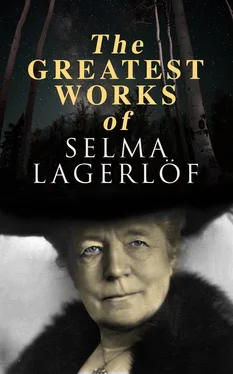The only place on the heath where the heather is not all-powerful, is a low, stony ridge which passes over it. There you'll find juniper bushes, mountain ash, and a few large, fine oaks. At the time when Nils Holgersson travelled around with the wild geese, a little cabin stood there, with a bit of cleared ground around it. But the people who had lived there at one time, had, for some reason or other, moved away. The little cabin was empty, and the ground lay unused.
When the tenants left the cabin they closed the damper, fastened the window-hooks, and locked the door. But no one had thought of the broken window-pane which was only stuffed with a rag. After the showers of a couple of summers, the rag had moulded and shrunk, and, finally, a crow had succeeded in poking it out.
The ridge on the heather-heath was really not as desolate as one might think, for it was inhabited by a large crow-folk. Naturally, the crows did not live there all the year round. They moved to foreign lands in the winter; in the autumn they travelled from one grain-field to another all over Götaland, and picked grain; during the summer, they spread themselves over the farms in Sonnerbo township, and lived upon eggs and berries and birdlings; but every spring, when nesting time came, they came back to the heather-heath.
The one who had poked the rag from the window was a crow-cock named Garm Whitefeather; but he was never called anything but Fumle or Drumle, or out and out Fumle-Drumle, because he always acted awkwardly and stupidly, and wasn't good for anything except to make fun of. Fumle-Drumle was bigger and stronger than any of the other crows, but that didn't help him in the least; he was—and remained—a butt for ridicule. And it didn't profit him, either, that he came from very good stock. If everything had gone smoothly, he should have been leader for the whole flock, because this honour had, from time immemorial, belonged to the oldest Whitefeather. But long before Fumle-Drumle was born, the power had gone from his family, and was now wielded by a cruel wild crow, named Wind-Rush.
This transference of power was due to the fact that the crows on crow-ridge desired to change their manner of living. Possibly there are many who think that everything in the shape of crow lives in the same way; but this is not so. There are entire crow-folk who lead honourable lives—that is to say, they only eat grain, worms, caterpillars, and dead animals; and there are others who lead a regular bandit's life, who throw themselves upon baby-hares and small birds, and plunder every single bird's nest they set eyes on.
The ancient Whitefeathers had been strict and temperate; and as long as they had led the flock, the crows had been compelled to conduct themselves in such a way that other birds could speak no ill of them. But the crows were numerous, and poverty was great among them. They didn't care to go the whole length of living a strictly moral life, so they rebelled against the Whitefeathers, and gave the power to Wind-Rush, who was the worst nest-plunderer and robber that could be imagined—if his wife, Wind-Air, wasn't worse still. Under their government the crows had begun to lead such a life that now they were more feared than pigeon-hawks and leech-owls.
Naturally, Fumle-Drumle had nothing to say in the flock. The crows were all of the opinion that he did not in the least take after his forefathers, and that he wouldn't suit as a leader. No one would have mentioned him, if he hadn't constantly committed fresh blunders. A few, who were quite sensible, sometimes said perhaps it was lucky for Fumle-Drumle that he was such a bungling idiot, otherwise Wind-Rush and Wind-Air would hardly have allowed him—who was of the old chieftain stock—to remain with the flock.
Now, on the other hand, they were rather friendly toward him, and willingly took him along with them on their hunting expeditions. There all could observe how much more skilful and daring they were than he.
None of the crows knew that it was Fumle-Drumle who had pecked the rag out of the window; and had they known of this, they would have been very much astonished. Such a thing as daring to approach a human being's dwelling, they had never believed of him. He kept the thing to himself very carefully; and he had his own good reasons for it. Wind-Rush always treated him well in the daytime, and when the others were around; but one very dark night, when the comrades sat on the night branch, he was attacked by a couple of crows and nearly murdered. After that he moved every night, after dark, from his usual sleeping quarters into the empty cabin.
Now one afternoon, when the crows had put their nests in order on crow-ridge, they happened upon a remarkable find. Wind-Rush, Fumle-Drumle, and a couple of others had flown down into a big hollow in one corner of the heath. The hollow was nothing but a gravel-pit, but the crows could not be satisfied with such a simple explanation; they flew down in it continually, and turned every single sand-grain to get at the reason why human beings had digged it. While the crows were pottering around down there, a mass of gravel fell from one side. They rushed up to it, and had the good fortune to find amongst the fallen stones and stubble—a large earthen crock, which was locked with a wooden clasp! Naturally they wanted to know if there was anything in it, and they tried both to peck holes in the crock, and to bend up the clasp, but they had no success.
They stood perfectly helpless and examined the crock, when they heard someone say: "Shall I come down and assist you crows?" They glanced up quickly. On the edge of the hollow sat a fox and blinked down at them. He was one of the prettiest foxes—both in colour and form—that they had ever seen. The only fault with him was that he had lost an ear.
"If you desire to do us a service," said Wind-Rush, "we shall not say nay." At the same time, both he and the others flew up from the hollow. Then the fox jumped down in their place, bit at the jar, and pulled at the lock—but he couldn't open it either.
"Can you make out what there is in it?" said Wind-Rush. The fox rolled the jar back and forth, and listened attentively. "It must be silver money," said he.
This was more than the crows had expected. "Do you think it can be silver?" said they, and their eyes were ready to pop out of their heads with greed; for remarkable as it may sound, there is nothing in the world which crows love as much as silver money.
"Hear how it rattles!" said the fox and rolled the crock around once more. "Only I can't understand how we shall get at it." "That will surely be impossible," said the crows. The fox stood and rubbed his head against his left leg, and pondered. Now perhaps he might succeed, with the help of the crows, in becoming master of that little imp who always eluded him. "Oh! I know someone who could open the crock for you," said the fox. "Then tell us! Tell us!" cried the crows; and they were so excited that they tumbled down into the pit. "That I will do, if you'll first promise me that you will agree to my terms," said he.
Then the fox told the crows about Thumbietot, and said that if they could bring him to the heath he would open the crock for them. But in payment for this counsel, he demanded that they should deliver Thumbietot to him, as soon as he had gotten the silver money for them. The crows had no reason to spare Thumbietot, so agreed to the compact at once. It was easy enough to agree to this; but it was harder to find out where Thumbietot and the wild geese were stopping.
Wind-Rush himself travelled away with fifty crows, and said that he should soon return. But one day after another passed without the crows on crow-ridge seeing a shadow of him.
Table of Contents
Wednesday, April thirteenth .
Читать дальше












